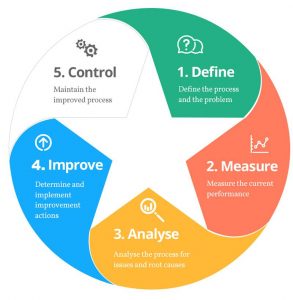Six Sigma online Training

What is Six Sigma?
Six Sigma is a quality management methodology used to help businesses improve current processes, products or services by discovering and eliminating defects. The goal is to streamline quality control in manufacturing or business processes so there is little to no variance throughout.Six Sigma certifications impart skills for different phases of DMAIC cycle (Define, Measure, Analyze, Improve, and Control) and problem-solving processes in order to save time and money, and in the process, improve performance to a great extent.
Who are Eligible for six sigma?
There is no eligibility criteria to do six sigma training. Six Sigma Certification can be done by anyone, from any domain, only pre-requisites is to have basic knowledge of English.Once training is completed, one has to pass certification test in order to become a certified six sigma professional.
Why Six Sigma Certification is Important?
Learning Six Sigma methodologies can help impact your career. The ability to add Six Sigma Certification to your resume proves your commitment to improving your business acumen, analytical skills, and work output.If you need only certification contant us.
Benfits With Six Sigma?
- Reduce Operational Cost.
- Helps Nature managerial and leadership ability.
- Improve Business Process and sustain quality Improvement.
Improve Accuracy, Controls, and Policy Compliance.
Improve Customer Service.
Improve Regularity Compliance.
- Improve Cash Flow.
Six Sigma Certification Levels
The Six Sigma comes in various skill levels:
White Belt
Yellow Belt
Green Belt
Master Black Belt
These certification can be Obtained through an accreditation body like the American society for quality (ASQ) and learn more about certificDeation
tails of six sigma certification eligibility are as follows:
- Six Sigma Green Belt: Six Sigma certification eligibility begins with the green belt level. Six Sigma Green Belt certified practitioners are known as part-time change agents. Six Sigma Green Belt certified personnel typically spend about 25 to 30 percent of their time contributing to Six Sigma projects and the remainder working in their respective operational areas. Six Sigma Green Belts are highly valued for the functional knowledge they bring to the project team. They are not only experts in Six Sigma, but; also experts in the process that they are improving. Six Sigma Green Belts help their project teams gather and analyze data, and play an important role in identifying and implementing improvements.
- You may acquire this certification after finishing a Lean Six Sigma Green Belt training.
- Six Sigma Black Belt: Black Belt certification is the second level in determining Six Sigma certification eligibility. Six Sigma Black Belt certified personnel lead project teams and act as mentors to individual team members. Leading Six Sigma projects is their primary responsibility and they practice it full-time. Qualifications for a Six Sigma Black Belt role include three to four years of relevant work experience and completion of two to three Six Sigma projects.
- Master Black Belt: Master Black Belt certification is the third and last level of Six Sigma certification eligibility. Master Black Belt certified personnel is the highest Six Sigma belts. They act as liaisons with senior management. Master Black Belts are technical experts. They are the six sigma authorities who coach, teach and mentor both project teams and corporate executives in the ways of Six Sigma.
